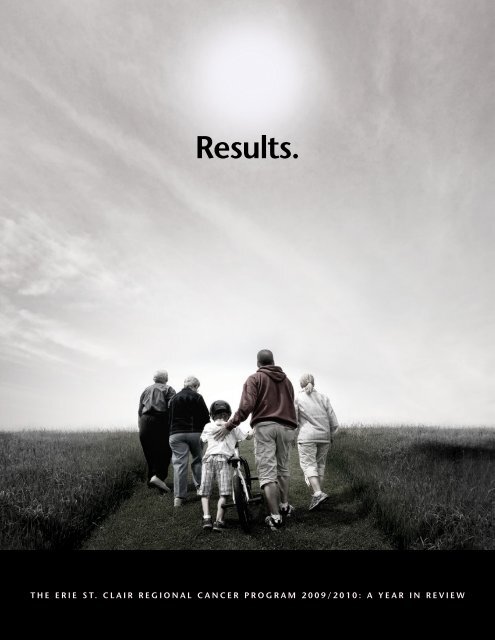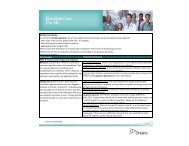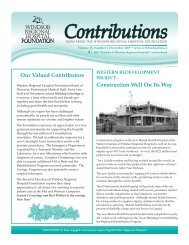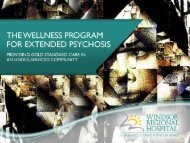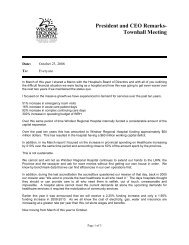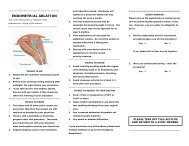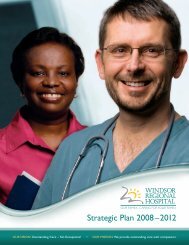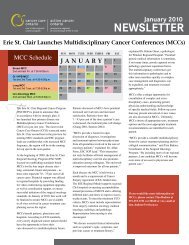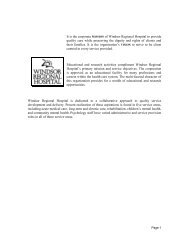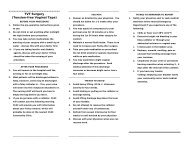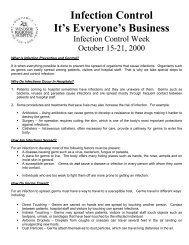Results. - Windsor Regional Hospital
Results. - Windsor Regional Hospital
Results. - Windsor Regional Hospital
- No tags were found...
Create successful ePaper yourself
Turn your PDF publications into a flip-book with our unique Google optimized e-Paper software.
R E S U L T S : 2 0 0 9 / 2 0 1 0 Y E A R I N R E V I E W , T H E E R I E S T . C L A I R R E G I O N A L C A N C E R P R O G R A Mthe windsor spitfires promote community awarenesseveryone needs to get checkedChecking for Colon CancerCHL Top Prospect Taylor Hall wearing the ColonCancerCheck logo.It has been a year of giant colons, silly puns and localstars talking colon cancer. In January we assisted anumber of health organizations in hosting the GiantColon at Devonshire Mall. The 40 foot long, eightfoot high multimedia exhibit, which attracted over4,000 visitors in just two days, offers an up-close look at diseases ofthe colon and prevention information.“People are getting the message,” said Elizabeth Dulmage, Managerof Cancer Prevention and Screening. “Ontario has one of theworld’s highest rates of colorectal cancer and this is our secondleading cause of cancer death – yet this is a highly curable disease.”Indeed, 90% of colorectal cancers can be prevented if detectedearly enough.In March, Colorectal Cancer Awareness Month, we launched anexciting partnership with the <strong>Windsor</strong> Spitfires. Players wore theColonCancerCheck logo on their home-game jerseys and theESC RCP was given an information table in the arena to promotescreening. Shoppers Drug Mart pharmacists attended and offeredfree Fecal Occult Blood Tests (FOBT) to those who qualified.Dr. John Day, Primary Care Lead for the program presented aneducational session for the Spitfire organization on the day of thelaunch. “It’s crucial to get screening messages out to young peoplelike these players,” said Dr. Day. “We know it takes a long time tochange behavior and the more they hear it, the more it will driveour message home.”On March 29th the Globe and Mail printed a page-two storyabout the partnership, giving the initiative national attention.“We were thrilled by the amount of on-going media coverage theprogram received,” said Communication Coordinator ChristieBezaire. “Thanks to the Spitfires, we were able to reach a muchwider audience, including sports fans.”In addition to the public awareness campaigns, the ESC RCP alsodelivered a workplace program called “Your Health Matters” tohundreds of employees throughout the region. Of the participantswho learned they were due for an FOBT, 42% obtained thetest within 12 months. Of those who learned they were due forcolonoscopy, 41% had the test within 12 months. Your HealthMatters is now expanding into more workplaces, in partnershipwith the Cancer Prevention Network Erie St. Clair.Outreach has also begun to First Nations communities in ErieSt. Clair. A culturally sensitive CCO program called “Take aStand” promotes colorectal cancer prevention and screening toAboriginal Communities. The ESC RCP began liaising with theAamjiwnaang First Nation in February and with the <strong>Windsor</strong>Essex Friendship Center, in partnership with the University of<strong>Windsor</strong> 4th-Year Nursing students, during January & March.Shoppers visit the Giant Colon at <strong>Windsor</strong>’s Devonshire Mall.Efforts to broaden this focus and expand the program’s reach willcontinue this year.Over the last 12 months, almost 17,000 FOBT kits have beenprocessed. As a result, our region’s participation rate has increasedmore than 10% (from 19.2% at program inception to thecurrent 29.7%). This is still short of the provincial target of 40%which motivates us to focus more attention on this effort. Ourpartnership with the <strong>Windsor</strong> Spitfires will expand in 2010/2011and we are now also seeking partnership with the Ontario HockeyLeague. Developing new and innovative ideas for the on-goingpromotion of ColonCancerCheck will remain a key focus for usas we strive to improve screening rates across the region.PHOTO COURTESY DAVE PICKFORD sports photographyESC RCP PHOTOIntroducing our Clinical LeadsCancer Care Ontario supports the development of Clinical Lead teams.Our region’s team is now complete, with eight Leads who work with ProvincialClinical Leads and with other regional Leads from across Ontario. They alsowork closely with their colleagues across the region to ensure the highestquality care for our patients. In these pages, we’re pleased to introduce youto our team.Pathology Lead: Dr. David ShumDr. David Shum is the ESC RCP’s new Pathologist Lead. In this role, Dr. Shumprovides regional leadership in building and maintaining quality pathologyand laboratory medicine services throughout the region. His focus will beon ensuring the quality of cancer pathology reporting. He will work withpathologists across the region to develop and implement identified qualitypathology improvement strategies.Primary Care Lead: Dr. John DayDr. John Day has provided Primary Care leadership across Erie St. Clair forover two years as the <strong>Regional</strong> Primary Care Lead. In this role, Dr. Day workscollaboratively with other primary care leads across the province to achievebetter integration of Primary Care along the cancer care continuum. Initially,the focus of the primary care program has been on improving screening anddetection rates within the ColonCancerCheck program.
Imaging Lead:Dr. Brigitte AlaA Key to Improved SatisfactionPatient Education StrategiesPatients need to be informed decision-makers.That’s why we included a comprehensivepatient-education strategy as a year-one coreinitiative. We are extremely proud of how wehave improved patient access to informationand education. Most recently, the <strong>Windsor</strong><strong>Regional</strong> Cancer Centre was selected topilot an innovative and interactive website called OncologyInteractive Navigator (OIN) for newly diagnosed colorectalcancer and melanoma patients.“OIN provides a wealth of information for patients, familymembers, care givers and health care providers,” explainedNicole Robinson, Patient Education Coordinator. “By includingthe OIN log-in information in our New Patient ReferralPackage, we now offer support and information before patientscome for their first appointment.” OIN allows patients to getinformation from the comfort of their homes sooner afterdiagnosis – a time of heightened anxiety and fear.The focus of OIN for 2010-11 will be to develop a communityoutreach strategy designed to make the program available to keyhealth care providers.An education website (www.cancerlrc.ca) connecting tocredible information within the cancer centre, the community,and to up-to-date resources, was also developed to help patientswho had not participated in the pilot, along with their familyand health care providers. The website includes a video tourof the cancer centre that gives new patients an idea of what toexpect when they come for treatment, along with testimonialsfrom former patients and program staff.Another key accomplishment was the opening of two LearningResource Centres at the regional cancer centre in the fall of2009. The centres, which are supported by Canadian CancerSociety volunteers, feature computers with Internet access, alending library and a wide variety of printed materials.Keriann Mahoney researches cancer informationwhile waiting for her appointment.“We have also successfully formed a Patient Education Committeethat includes multidisciplinary representation,” explained MarieLachapelle, Manager of Outpatient Clinics <strong>Regional</strong> SystemicProgram. “The committee meets regularly to present, review andconsolidate information. Together we have revamped the NewPatient Referral Package, and are in the process of updating ourPatient Orientation Packages and Radiation and Chemotherapyeducation classes.”The patient-education strategy also asked patients and familiesto tell us how they felt about their treatment experience throughfocus groups and a new patient satisfaction survey. The survey wasdesigned to build on the Ontario <strong>Hospital</strong> Report Card PatientSatisfaction Survey implemented by NRC Picker and was intendedto more specifically identify program strengths and opportunitiesfor improvement in areas such as patient education.A communication strategy is now being developed to disseminatethe results to patient-care teams throughout the cancer program.They, in turn, will develop strategic and evidence-based goals forimprovements within the next year.Dr. Brigitte Ala assists in the on-going development of the new provincialCancer Imaging Program, the goal being to enhance the patient journey byidentifying and implementing cancer imaging standards, quality indicators andknowledge transfer strategies. A key focus for Dr. Ala will be to engage regionalRadiologists in identifying and implementing regional cancer imaging qualityimprovements.Research & Clinical Trials Lead:Dr. Caroline HammDr. Caroline Hamm became Research and Clinical Trials Lead over threeyears ago. She works closely with fellow Oncologists and colleagues at theUniversity of <strong>Windsor</strong> to build and enhance the profile of cancer research.Under her leadership, patient participation in clinical trials has improved,allowing effective new treatments to become standardized care options.
R E S U L T S : 2 0 0 9 / 2 0 1 0 Y E A R I N R E V I E W , T H E E R I E S T . C L A I R R E G I O N A L C A N C E R P R O G R A MMultidisciplinary Cancer ConferencesThe success of our Multidisciplinary CancerConferences (MCCs) has become a pointof pride; the Erie St. Clair <strong>Regional</strong> CancerProgram has launched four primarydisease site MCCs in just one year. As ofJanuary 2010, the region is one of only two cancer programsin Ontario to fully meet the Cancer Care Ontario’s MCCstandards established in 2006.MCCs are regularly scheduled meetings in whichrepresentatives from surgery, medical oncology, radiationoncology, pathology, and diagnostic imaging present patientcases and discuss treatment options. Research shows thatpatient outcomes can improve through multidisciplinary cancerconferencing, especially in complex cases. Representation fromall disciplines is a minimum standard as is bi-weekly frequency.“MCCs offer patients the benefit of combined expertise acrossmany specialties related to their condition and, ultimately,the best treatment,” explained Dr. Ken Schneider, Chief ofOncology at <strong>Windsor</strong> <strong>Regional</strong> <strong>Hospital</strong>. “These sessions giveerie st. clair scores tops in ontariodoctors an opportunity to collaborate with their peers aboutcomplex or cross-disciplinary cases to arrive at a treatmentapproach from collective physician opinions.”The promotion of multidisciplinary cancer conferencing wasa year-one core initiative. At the beginning of 2009, the ErieSt. Clair Surgical Oncology Program (ESC SOP) focused onestablishing standards-based MCCs for the four major diseasesites – lung, colorectal, breast and uro-oncology – whichrepresent 70-75% of all cancer cases. A potential year-three goalwill be to begin tracking measurable post-surgery outcomes togauge the effectiveness of the conferencing.“MCCs are a great asset for planning surgical pathways becausesurgeons have the opportunity to seek input from all specialtiesinvolved in complex cases,” explained Dr. Allan Forse, Lead ofthe Erie St. Clair Surgical Oncology Program. “These forumsgive us the opportunity to challenge our decision-makingwith our colleagues and they often include teaching sessionsthat involve reviewing new medical literature. The end result isimproved outcomes for all our patients.”Videoconferencing allows physicians from all regional hospitalsto participate and present cases, allowing for broader consultationand expertise sharing.Tina Badour, SOP Coordinator, is responsible for organizingthe conferences. “As we move into year three of our strategicplan, the goal will be to increase participation, frequency and toenhance the current process. Our aim is to earn a number-oneprovincial ranking on the CCO scorecard,” said Badour. “Wewill work to maintain our current success and support regionalcorrespondence to enable the long-term success of theseconferences.”With financial assistance, participating hospitals have upgradedtheir videoconferencing equipment to improve image quality.MCCs benefit patients, physicians and hospitals. The <strong>Regional</strong>Cancer Program is proud to provide this opportunity to the ErieSt. Clair physicians.A cross-section of physicians collaborate on a patient’s treatment planat a Multidisciplinary Cancer Conference.Surgical Oncology LeadDr. Allan ForseDr. Allan Forse has served as Surgical Oncology Lead for the Erie St. ClairSurgical Oncology Program for four years. He works with Cancer CareOntario to foster quality improvements in cancer surgery by developingevidence-based guidelines and standards, and by measuring and providingfeedback on performance indicators. He has played a key role in developinga successfull regional Multidisciplinary Cancer Conference model.Systemic Oncology Lead:Dr. Yasmin AlamDr. Yasmin Alam has served as Systemic Oncology Lead for several years.Dr. Alam plays a key leadership role in the overall provision of systemictreatment services within the Medical Oncology Program at the <strong>Windsor</strong><strong>Regional</strong> Cancer Centre. The implementation, tracking and monitoring ofprovincial systemic standards at all systemic treatment sites in Erie St. Clair is aquality improvement focus for the Erie St. Clair <strong>Regional</strong> Cancer Program.
R E S U L T S : 2 0 0 9 / 2 0 1 0 Y E A R I N R E V I E W , T H E E R I E S T . C L A I R R E G I O N A L C A N C E R P R O G R A MYear-3 Core InitiativesContinue ImplementingDiagnostic AssessmentPrograms (DAPs)Through regional expansion ofthe Lung Diagnostic AssessmentProgram and monthly tracking ofperformance, we have improvedpatient access to timely lungcancer diagnosis. As of January2010, 80% of our patients werereferred to consultation in 14days, and 70% went from consultto biopsy in 10 days. We willcontinue to work toward our goalof 90% of referred patients beingassessed by a specialist within 14days.Exciting advances are progressingfor the implementation of BreastDiagnostic Assessment Programs.Planning and execution of theseprograms are currently underwayat Hôtel-Dieu Grace <strong>Hospital</strong>and Bluewater Health in Sarnia.The addition of the Breast DAPin Sarnia will mean that patientsin each area of the Erie St. ClairLHIN will now have local accessto an organized breast assessmentprogram.This year consideration willbe given to the potential of aColorectal Cancer DiagnosticAssessment Program. Theorganization, coordination andsupport provided through DAPshave proven to benefit patientsand physicians. We would like toextend this quality care initiativeto colorectal cancer. This initiativeis also linked to two priority goalsof the Ontario Cancer Plan –improving access to quality cancercare and improving the patientexperience. Cancer Care Ontariohas developed a DAP unit topromote and assist regions andhospitals in their development ofstandard based DAPs.Continue Development ofIntegrated Palliative CareDeliveryThe integrated delivery ofpalliative care will allow us tostreamline and better coordinateregional palliative care servicesresulting in improved care forpatients and families. Over thelast two years, through the ESCEnd of Life Network, there havebeen many wonderful successesincluding a <strong>Regional</strong> Palliative& Hospice Care Report, theImplementation of an EducationStrategy and the Long Term Care– Train the Trainer Initiative.In keeping with the expertteam recommendation withinthe integrated care report, the<strong>Windsor</strong> <strong>Regional</strong> CancerProgram (WRCP) welcomedPalliative Nurse PractitionerRita DiBiase to their Model ofCare team in the winter of 2010.The program has also supporteda fellowship for Dr. GordonGiddings at the University ofOttawa, paving the way for himto join the WRCP team as apalliative physician in the fall of2010. In partnership with othercommunity resources, these staffadditions will fill a significantexpertise gap for patients receivingcare at the Cancer Centre or as aninpatient on the Oncology Unit.The focus of palliative caredelivery for year three will be thecontinued development of thisWRCP specialized palliative careteam so that we might better meetthe unique needs of our palliativepatients and their families.Create aPatient EducationStrategyIf patients are to activelyparticipate in their care planning,they need information to makeempowered, educated and timelydecisions.To achieve this goal, weestablished an interdisciplinaryPatient Education Committee.Two Learning Resource Centreshave been opened in the <strong>Windsor</strong><strong>Regional</strong> Cancer Centre. Theserooms have computers, alending library and informationpamphlets. A new patient andfamily website, www.cancerlrc.cais accessible from anywhere inthe world and a new patientorientationvideo offers basicinformation about out-patientcancer treatment.A primary goal for year three is torevise and update the new patientreferral packages and orientationmaterials, with a strong focus onproviding patients relevant andtimely information. There willalso be a focus on linking withregional care providers to providepatients consistent and accurateinformation across the continuumof care. As well, we have recentlybeen selected to pilot aninnovative patient and familyweb-based support tool calledOncology Interactive Navigator.It is funded by the CanadianPartnership Against Cancer andhas been implemented with allnewly referred colorectal andmelanoma cancer patients.Finally, we need to updatepatient education materials witha consistent look and feel andwith content that is current andrelevant to cancer patients.Create a <strong>Regional</strong>CommunicationStrategyEffective communication is keyto providing vital informationabout cancer care to our regionalpartners, the medical communityand the community at large.Over the last two years theESC RCP has developed aCommunications Plan, andpartner publications that includeannual reports and regularelectronic newsletters.We have also worked on buildinga strong relationship with ourmedia partners in an effort to relayimportant information to thepublic.Effective coordination of caredemands timely communication.Based on this notion, a potentialfocus for year three of our workplan will be the development ofreferring physician informationpackages. The goal of this initiativewill be to improve partnercommunication and potentiallydecrease patient wait-times fromreferral to oncology consultation.Development of a <strong>Regional</strong>Community Advisory Committeewill be a key year-three initiative.To support the ongoing use ofpatient and family feedback focusgroups and satisfaction surveys,a suggestion or comments boxstrategy will also be implemented.Consideration is also being givento the piloting of an ESC RCP‘cancer’ magazine.Continue Effort toShorten RadiationWait TimesWe understand that once diagnosedwith cancer, patients are oftenanxious to begin treatment.Timely access is key to high qualitycancer care and improving patientsatisfaction.During year one and into year twoof this plan the <strong>Windsor</strong> <strong>Regional</strong>Cancer Centre achieved significantreductions in radiation wait times butwe were unable to sustain that level ofservice. We will continue to focus onthe reduction of radiation wait timesas one of our most pressing goals,aspiring to the provincial goal for 90per cent of cancer patients to accesstreatment within 14 days of referral.The Radiation Oncology Program iscommitted to providing the highestquality of patient care, which webelieve cannot be achieved withoutconsistent and timely access.Develop anIdeal Modelof CareTwo questions are key to thedevelopment of an ideal model ofcare:1) Are patients receiving the rightcare at the right time by the rightperson?2) Are patients receiving seamless,efficient care that maximizes theexpertise of all the members ofthe care team?Over the last two years of this workplan, the cancer program has listenedto the ideas, needs and concerns ofour patients through focus groupsand patient satisfaction surveys.Along with input from communitycare providers and cancer programphysicians and staff, this feedbackwill guide the development of anideal model of care delivery forpatients and families, and improvetheir care experience.In year two, our beginningwork focused on LEAN qualityimprovement initiatives withinhematology, pharmacy andgynecology brachytherapy. NursePractitioners have also joined the<strong>Windsor</strong> <strong>Regional</strong> Cancer Programcare team. The optimal utilization oftheir skills and expertise will be animportant component of model ofcare planning.During year three, a charteringprocess, we will lead thedevelopment of an ideal model ofcare by engaging frontline staff fromacross the care team. Charteringwork will identify overarchinggoals, key objectives and specificactivities for the cancer program, tocollectively pursue to ensure patientsand families consistently receive theseamless, responsive and high qualitycare they deserve.Did you know...In Ontario, the five-year survival rate for colon and rectumcancer has increased 20% over the previous five years –from 50% to 60%, thanks to improved treatments andearlier diagnosis.More ESC men and women are attempting to quitsmoking than in Ontario overall – 52% vs 47%.Even so, we still need to improve. We still smoke too much,drink too much, we don’t eat enough fruits and vegetablesand we are not physically active. Smoking, obesity &alcohol consumption are all higher in Erie St. Clair (ESC)than in Ontario overall. Physical activity and fruit /vegetable consumption are lower than in Ontario overall.We do well with cancer screening in ESC, with highermammography rates than provincial averages- 69% vs. 66%.Participation in Fecal Occult Blood Test (a key indicatorof colon cancer) needs improvement. The currentparticipation rate matches the Ontario average of 30%.We also need to improve wait times for colonoscopyafter a positive FOBT – only 59% are seen within theeight-week benchmark, compared to 63% provincially.We do well with surgery wait times, with 77% completedwithin priority wait targets compared to 73% provincially.Our Multidisciplinary Cancer Conferences are also astrong point, with 91% adherence to standards comparedto 64% province-wide.For radiation therapy, we need to shorten wait timesbetween referral and consultation. Only 42% fall within the14-day benchmark, compared to 68% in Ontario overall.We’re doing better with Physician Order Entries forsystemic therapy treatment visits. Computerization is saferfor patients and reduces the risk of error. Our participationrates are 79% compared to 66% overall.In Supportive Care, our symptom survey tool is beingwidely used: 73% compared to 31% overall. Thisimproves timely response to help patients managesymptoms such as pain, nausea and breathing difficulties.In Palliative Care, however, we still need improvement;55% of patients died in an acute-care hospital settingcompared to 52% in Ontario overall.
d e s i g n & P h o t o g r a p h y * :H a r g r e a v e s S t e w a r t I n cErie St. Clair <strong>Regional</strong> Cancer Program2220 Kildare Road<strong>Windsor</strong>, ON N8W 2X3519-253-3191 Ext. 58540www.cancercare.on.ca/rcp*except as indicated


